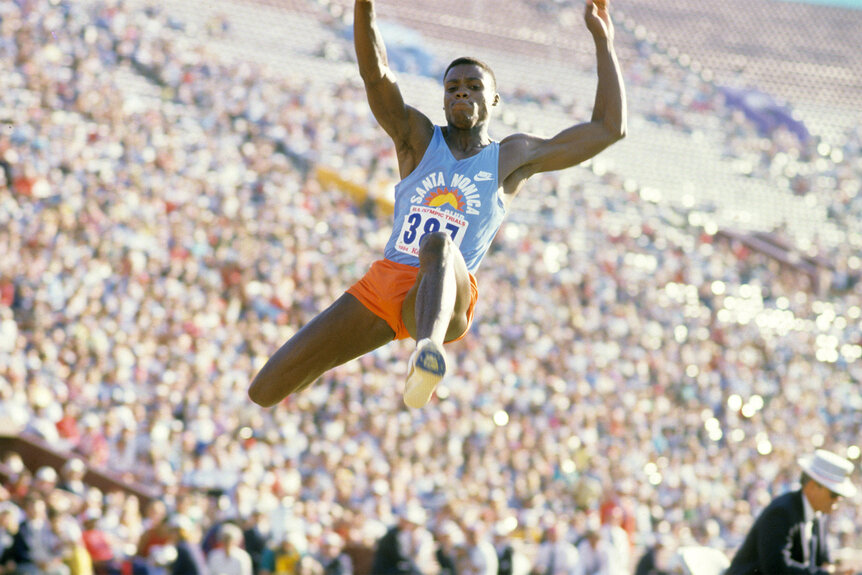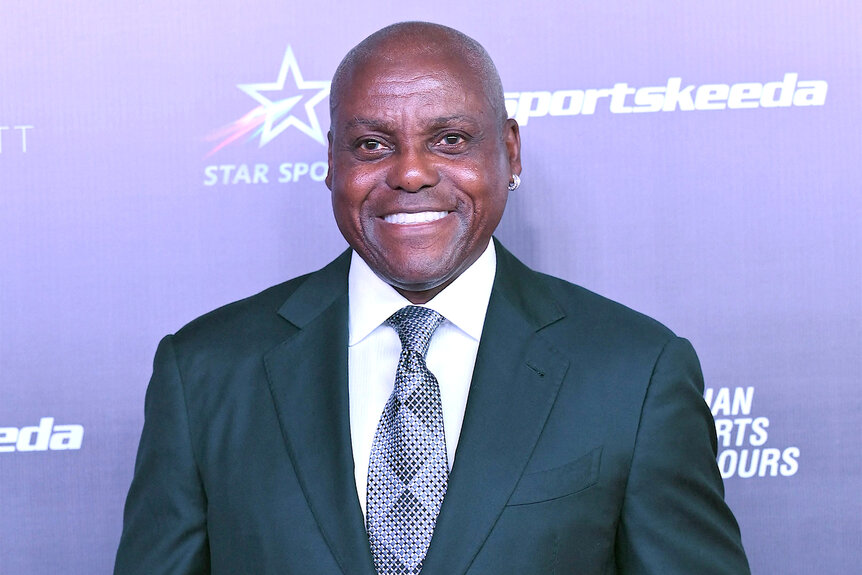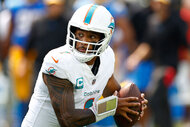Create a free profile to get unlimited access to exclusive show news, updates, and more!
How Track and Field Star Carl Lewis Earned the Title "King Carl" at the Olympics
Now in his ninth season coaching at the University of Houston and first as the head coach, Olympic legend “King Carl” is widely recognized as one of the greatest athletes of all time.

Amidst the carousel of the never-ending and often incendiary conversations on the topic of the greatest male athletes of all time — Michael Jordan, Babe Ruth, LeBron James, Muhammad Ali, Roger Federer, Wayne Gretzky, Tom Brady, Lionel Messi and Michael Phelps, to name a few — while not forgotten, legendary Olympian Carl Lewis is not always included in those conversations, even though he should be.
Generally speaking, due primarily to the sport’s limited commercial visibility, track and field athletes aren’t regarded like the titans of team sports like those who basketball, football, soccer and baseball, nor are the most decorated among them revered in the same way in which fans and pundits alike assess the heroes of individual athletic competitions like those in golf and tennis.
Still, no matter how you slice it, Lewis’ commitment to be the best and his ability to excel past those lofty, self-imposed expectations make him worthy of the adulation for which we shower many other athletes, who most likely haven’t experienced half the success Lewis did in his decades-long career.
RELATED: The Olympic Medals in Paris Will Literally Contain a Piece of the Eiffel Tower
Carl Lewis Makes Appearance at Opening Ceremony
The famed track and field star made an appearance at the Paris Summer Games Opening Ceremony alongside other greats like Serena Williams, Nadia Comaneci, and Rafael Nadal as part of the passing of the torch. Together, the crew of athletes rode a boat on the Seine and handed the torch to yet another group of athletes.
How did Carl Lewis’ career in track and field start?
After the Alabama native endured an explosive growth spurt of two and a half inches in just one month — a physical trauma that relegated the shy, 15-year-old kid to crutches for months until his body was capable of handling the added physical stress that accompanied that meteoric growth — it was only a matter of time before Lewis, who was then coached by his parents Bill and Evelyn Lewis on the local track team in Willingboro, New Jersey, would showcase his once dormant now enormous potential.
His tremendous high school career laid the foundation for a transcendent collegiate career at the University of Houston where, in 1981, according to Biography, he matched his childhood idol Jesse Owens to become just the second person in NCAA history to win college championships in the long jump and the 100-meter race. Those accolades not only earned him the coveted title of the top U.S. amateur athlete, but they also launched his historic Olympic career.
Carl Lewis' Olympic History
After President Jimmy Carter ordered the American athletes to boycott the 1980 Olympic Games in Moscow, Russia, according to Politico — the USA was one of 15 countries to withdraw from the Summer Games due to the Soviet Union’s unprecedented invasion of Afghanistan — Carl Lewis’ first shot to display his incredible talents was snuffed out, but the emerging superstar would go on to compete in four Olympic tournaments over the course of his distinguished career. The first tournament he competed in was at the 1984 Los Angeles Games where his four gold medals matched his hero, Jesse Owens. After his revelatory performance at the Games in Southern California, Lewis went on to compete in three more Olympic tournaments: the 1988 Games in Seoul, Korea; the 1992 Games in Barcelona, Spain; and the 1996 Games in Atlanta, Georgia.
Carl Lewis' Medals and Achievements
Coming into the 1984 Summer Games in Los Angeles, California, Carl Lewis had immense amount of pressure on his shoulder to succeed, and after winning gold medals in the 100-meter race, the 200m, the long jump and the 4x100m relay, not only did he match Jesse Owens’ triumphant, four-medal winning performance, he cemented himself as a pillar who would not buckle under the expectations of an entire nation. But that was just the beginning of “King Carl’s” legacy.
After Canadian sprinter Ben Johnson — one of Lewis' biggest rivals — was disqualified during the 1988 Games in Seoul, Korea, for using anabolic steroids, according to Sports Illustrated, Lewis defended his 100m title by again capturing the gold medal while also earning another gold medal for his spectacular, high-flying long jump performance that same year. He notched an additional silver medal in the 200m, and yet, Lewis’ Olympic torch still had a significant amount of flame left to burn.
During the 1992 Games in Barcelona, Spain, Lewis maintained his dominance in the long jump by leaping 8.67m and won his third gold medal in the event, defeating the world record holder Mike Powell by just three centimeters, according to Olympics. In another superb performance during those Games, Lewis anchored the 4x100m relay, covering the final leg of the race in a blistering 8.85 seconds to power the Americans to another gold medal-winning time of 37.40 seconds — a world record which stood unchallenged for 16 years.
Then, at the 1996 Games in Atlanta, Georgia, Lewis did the unthinkable: at age 35, Lewis qualified for the long jump for a fifth time, becoming the first American male athlete to do so. With the biggest threat to Lewis neutralized due to Powell being injured, Lewis surpassed Jamaica’s James Beckford by 8.25 inches to again claim the gold medal in the event.
RELATED: Olympian Mary Lou Retton Gives an Update on Her Battle with Rare Form of Pneumonia
Carl Lewis and Idol Jesse Owens
For any young competitor whose sights are set on becoming a professional athlete, the requisite recipe of skill and intangibles is forged over a lifetime of triumph balanced by heartbreak. When the going gets tough, the tough get going, but no matter how much promise a talented youngster might show, the key to unlocking that extra gear, the one that propels you forward when there are barely any fumes left in an empty tank, often comes down one thing and one thing only: inspiration.
Whether found in family, faith, or the athlete posters plastered across millions of bedrooms across the country, heroes exist for a reason, and the inspiration of their magic to empower us to do great things is immeasurable in value. Luckily for Carl Lewis, not only did he have his athletic father and mother to help guide him on his journey toward greatness, he had the original titan of track and field, Jesse Owens, whose trailblazing Olympic heroics helped set the course for Lewis to not only emulate the man he looked up to so much, but to first match his greatness, then excel past it.
“Growing up, my father talked about Jesse Owens,” Lewis revealed on the Oprah: Where Are They Now? Olympic Legends television special. “So, when I was finally able to meet Jesse Owens at a track meet, I was the smallest kid, and I was on the top of the podium, so he talked about how this funky little kid got there and had success, and I never forgot that.”
"When you meet someone like that, you admire them your whole life," continued Lewis. "And then when I decided to try, people said, 'You can't do it. You can't do it.' I just felt that spirit I got to try it."
"When Jesse talked about going to Berlin [Germany] and having to go up the service elevator because of the color of his skin — all of those things, it inspired me to not be afraid to try."
At the end of the day, whether the sports media zeitgeist decides to acknowledge Lewis for his greatness and elevate him to be somewhere within the myriad of GOAT conversations he’s warranted to be in, it doesn’t really matter because long after we’re all gone, the record books will still objectively embrace him based on his merits and the accolades he battled for and won. His achievements in the long jump make Lewis one of only three Olympic athletes to win the same event four times, and he is one of only four Olympians to win a staggering nine gold medals.
Where is Carl Lewis now?
After making history in the sport, Lewis retired from track and field in 1997. He is now in his 60s and working as head coach for the University of Houston's Track and Field team.
To see how Team USA performs at the 2024 Olympics, tune in to Peacock and NBC beginning July 26.
Originally published Feb 14, 2024.

















